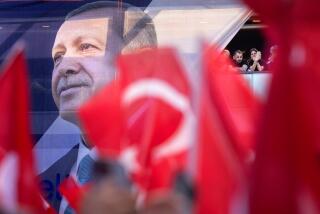Turks Feeling Closer to Gulf Battlefields : Second front: America’s NATO ally is the prime regional target for the terrorists Iraq threatens to unleash.
- Share via
ANKARA, Turkey — Clad for a winter of war in snow, smog and anxiety, this Turkish capital is far from Middle Eastern battlefronts--and too close.
Echoes in Ankara on Tuesday of an overnight terrorist bombing at an American military depot in Istanbul drove Turks and foreigners farther behind gates that were already double-locked when war began.
It is no secret that second-front Turkey, an up-front U.S. ally, is the prime regional target for the terrorists whom Saddam Hussein vows to unleash on the world.
“Nobody hurt this time; that’s lucky. I can only assume there will be more attacks,” said a diplomat whose country is part of the multinational alliance against Iraq. The diplomat’s home is a fortress, his movements as furtive as a man trying to hide a mistress.
American warplanes based in Muslim Turkey are bombing northern Iraq, angering not only Baghdad but also many Turks: 89% of 400 Istanbul residents told the newspaper Hurriyet on Tuesday that they oppose any further Turkish involvement in the gulf fighting.
War or not, in the best of times Turkey is afflicted by urban terrorists and rural guerrillas who hate both the Turkish government and the United States.
Some are Marxists. Some are Muslim fundamentalists. Some kill by conviction, Some kill for money.
It is a deadly combination.
“I don’t worry about the terrorist terrorists as much as about the mercenary terrorists,” said one European who has spent his 30 years in the Middle East. “This is one of the easiest places to rent a killer.”
Neither is crossroads Turkey any stranger to Arab terrorism. In 1986, members of Abu Nidal’s Palestinian terror gang machine-gunned a synagogue in central Istanbul, killing 21 worshipers.
Last year, four prominent Turkish secularists were murdered by Muslim fundamentalist assassins of Iraqi or Iranian inspiration, Turkish officials have said privately. There are now fretful reports of Iraqi terrorists focusing on Turkey, but no substantive information.
With NATO-member Turkey a willing platform for U.S. attack planes, national preoccupation with terrorism is acute.
Asian Ankara, like European Istanbul, spends its nights behind bolted doors. There are tables aplenty now in Ankara restaurants that demanded reservations 10 days ago. Some diplomats, particularly Arabs whose countries are siding with the United States, have literally not left their embassy residences since the war began.
By American Embassy count, there were about 5,000 U.S. military personnel, 5,000 dependents and about 4,000 other American civilians in Turkey when the war began. Many dependents and businessmen have left; others stir as little as possible. A businessmen’s hotel here, full two weeks ago, now has an occupancy rate of around 25%.
Roads are closed to traffic around the U.S. Consulate in Istanbul, damaged by a terrorist pipe bomb last year, when a launch called the Hiawatha, donated to the consulate by a retiring diplomat, was firebombed.
Tourism, a major source of income for Turkey, is dead. No American airline flies to Turkey any more, and all but a handful of European carriers have canceled their service as well.
The State Department warns Americans against travel in the southeast, where Turkey has a heavily fortified 200-mile-long border with Iraq. In the southeast, Kurdish rebels have been skirmishing sporadically with the Turkish army in seven years of violence that has claimed 2,000 lives and sometimes spills from mountain villages into big cities.
Prudence is the best defense, people say, in a country where internecine political violence helped trigger a 1980 coup, and, in a minor key, has survived the return to democracy that began three years later.
By one careful count, in Turkey last year there were 19 major political assassinations--most of them in Istanbul--of politicians, police and military officers and journalists. No killers were caught.
More to Read
Sign up for Essential California
The most important California stories and recommendations in your inbox every morning.
You may occasionally receive promotional content from the Los Angeles Times.












